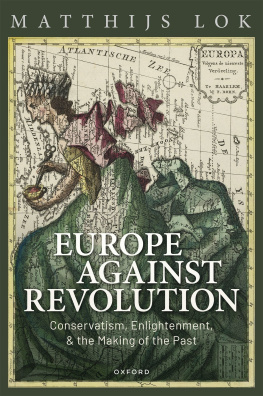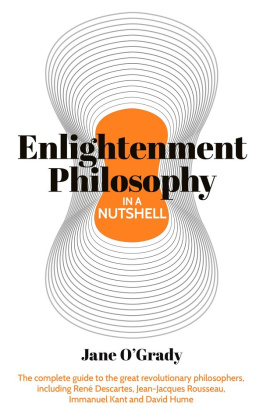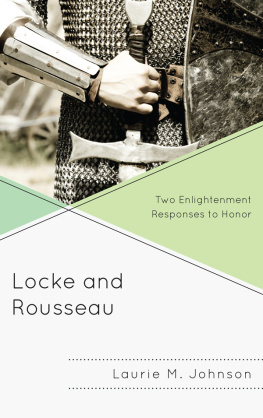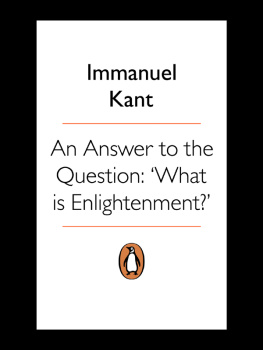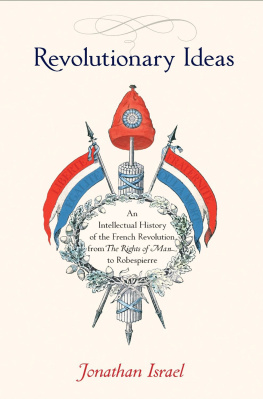Norman Hampson held a chair in history at the University of York from 1974 to 1989. He was born in 1922 and educated at Manchester Grammar School and University College, Oxford. His service in the Navy from 1941 to 1945 included two years as liaison officer with the Free French Navy. From 1948 until 1967 he was on the staff of Manchester University. He is also the author of La Marine de Van II (1959), A Social History of the French Revolution (1963) biographies of Robespierre (1974) and Danton (1978) and Will and Circumstance: Montesquieu, Rousseau and the French Revolution (1983).
THE ENLIGHTENMENT
Norman Hampson

PENGUIN BOOKS
PENGUIN BOOKS
Published by the Penguin Group
80 Strand, London WC2R 0RL , England
Viking Penguin Inc., 40 West 23rd Street, New York, New York 10010, USA
Penguin Books Australia Ltd, Ringwood, Victoria, Australia
Penguin Books Canada Ltd, 2801 John Street, Markham, Ontario, Canada L3R 1B4
Penguin Books (NZ) Ltd, 182190 Wairau Road, Auckland 10, New Zealand
Penguin Books Ltd, Registered offices: 80 Strand, London WC2R 0RL , England
First published in Pelican Books 1968
Reprinted with new Bibliographical Note 1982
Reprinted in Penguin Books 1990
15
Copyright Norman Hampson, 1968
All rights reserved
Except in the United States of America, this book is sold subject to the condition that it shall not, by way of trade or otherwise, be lent, re-sold, hired out, or otherwise circulated without the publishers prior consent in any form of binding or cover other than that in which it is published and without a similar condition including this condition being imposed on the subsequent purchaser
978-0-14-193713-7
To the memory of my father
CONTENTS
PREFACE
T HE historian who writes about a concrete subject, such as the battle of Waterloo, begins with what might be considered an advantage: however interpretations of the causes and consequences of the battle may differ, there is general agreement that it did exist, that it occurred in a specific place, at a particular time, and that the French lost. The Enlightenment, on the other hand, only existed to the extent that it appears meaningful to isolate certain beliefs and ways of thinking and behaving, and to regard these as especially characteristic of a particular period. At most, it can only be regarded as a significant statistical concentration, not as an event. However one defines Enlightenment, some of its characteristics have been present in most ages and no period of history has seen the general acceptance of them all. Moreover, these characteristics were not facts but attitudes, and a book like Montesquieus De lesprit des lois admits of more interpretations than a peace treaty or a budget. The attitudes which one chooses to regard as typical of the Enlightenment therefore constitute a free, subjective choice, which then, in turn, determines the shape of the synthesis one constructs for ones self. It may be argued with equal plausibility that Rousseau was either one of the greatest writers of the Enlightenment or its most eloquent and effective opponent. After weighing what the writers of the time thought of themselves and their period, one must finally impose a personal pattern on the rich anarchy of the evidence. Within limits, the Enlightenment was what one thinks it was. This book embodies one particular synthesis, one personal point of view. It will have failed in its purpose if the reader simply endorses this interpretation as his own. I hope he will be stimulated, and if necessary provoked to disagree and to seek his own synthesis.
There does not seem to me much point in attempting any general definition of the movement. Such a definition would have to include so many qualifications and contradictions as to be virtually meaningless, or else prove so constricting that logic would continually be trying to debar what common sense insisted on including. I would, however, assert that whatever is meant by the Enlightenment refers to ways of thinking and behaving that permeated many aspects of life. It was an interlacing pattern in which the facts of history, the creations of the arts, the discoveries of science and the speculations of philosophy reacted upon each other and in turn affected mens attitudes to history, the arts, science, philosophy and religion. Any one of these strands may be followed in isolation, but to appreciate the causes and consequences of its peculiar convolutions one must try to attain some kind of simultaneous perception of the pattern as a whole. If one is to have any chance of doing so, one must take liberties with chronology. In the arrangement of the book I have therefore concentrated on themes rather than on individuals. Part One deals with ideas and attitudes that originated early in the period and follows them through to the second half of the eighteenth century. The attitudes studied in Part Two arose, in part at least, from the problems raised by the early Enlightenment, but the two overlapped in time and the same man might well have a foot in each camp. Such a plan may make it difficult for the reader to appreciate at once the particular contribution of someone like Montesquieu or Diderot, but the alternative appeared to me to be even more confusing.
To do justice to all the various ramifications of such a diverse movement, throughout the whole of civilized Europe, would require a rare combination of talents, to which I make no pretensions. No one, I hope, is more aware than I of the limitations which time, space and my own ignorance have imposed on this essay. Whole subjects on which I do not consider myself competent to express an opinion, such as music, painting and architecture, have been excluded. With comparatively unimportant exceptions, I have restricted myself to the movement of ideas in England, France and Germany. Even so, the subject covered is far too wide for me to advance any claims to exhaustive scholarship. Time and again, I have had to rush in where specialists, quite properly, fear to tread. My justification is quite simple. The Enlightenment was, to a remarkable degree, a period when the culture of the educated man was thought to take in the whole of human knowledge. A writer like Voltaire attained a European reputation as dramatist, poet, historian and philosopher at a time when philosophy could not be divorced from theology. He was also the man who introduced Newtonian physics, on which his own philosophy was largely based, to the educated French public. In dealing with an age which would have regarded the conception of two cultures as equivalent to no culture at all, there is perhaps as much distortion in the specialist investigation of one subject in isolation from its contemporary context, as in the more superficial survey of the period as a whole. I certainly feel that whatever insight into the Enlightenment I have been able to attain is directly due to this kind of synthetic approach.
The question immediately arises of the relationship between the different parts of this integrated whole. The reader may well ask how social and economic factors conditioned, or were conditioned by, the ideas of men who were shaped by the society in which they lived, and which they themselves helped to modify. An introductory essay of this kind is no place for the microscopical examination which would be necessary to arrive at even the most tentative answer in any specific instance. I have therefore not felt justified in doing more than throw out occasional hints of a possible relationship. At a superficial glance, the political stability of the period from 1715 to 1740 seems to fit the confident deism of some of the writers of the time and the increasing doubt of the intellectuals appears to coincide with the European wars of 174063 or the unrest that culminated in the French Revolution. But any such hasty parallels break down on examination. It would be absurd to attribute to the philosophy of the Enlightenment the invasion of Silesia by Frederick II of Prussia in 1740 which began the series of wars. The darkening of the intellectual horizons did not begin until some time later, and the greatest upheaval of all, the French Revolution, at first seemed to vindicate the optimists and to announce a period of European peace. The same year 1749 saw the publication of Condillacs Newtonian Trait des systmes which attacked teleological science, Buffons assertion of the fixity of species, Diderots Lettre sur les aveugles , which pointed towards materialist determinism, and the prize essay in which Rousseau began his assault on the accepted values of his age. It would be an ingenious dialectician who could harness four such dissimilar horses to the chariot of historical necessity. In more general terms, the attempt to relate the ideas of the Enlightenment to some hypothetical rise of the bourgeoisie seems to me, as I have indicated elsewhere, to rest on very insecure foundations. I am far from suggesting that causal relationships between economic developments, social attitudes and intellectual speculations did not exist. On the contrary, everything appears to me to suggest such a symbiosis, but one whose nature and mode of operation is almost inconceivably complex if not actually incomprehensible.


